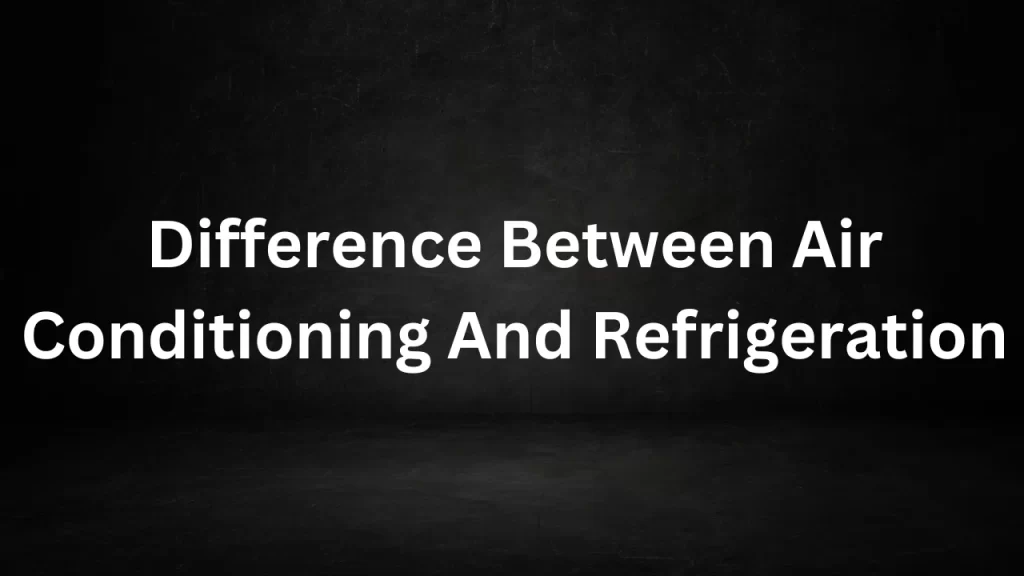Difference Between Air Conditioning And Refrigeration
Difference Between Air Conditioning And Refrigeration: Air conditioning and refrigeration are two closely related but distinct technologies that play vital roles in our daily lives, particularly in maintaining comfortable indoor environments and preserving perishable goods.
While both systems involve the transfer of heat, they serve different purposes and have specific applications. In this article, we will explore the key differences between air conditioning and refrigeration.

Difference Between Air Conditioning And Refrigeration
Air Conditioning
Air conditioning refers to the process of regulating the temperature, humidity, and air quality in indoor spaces, such as homes, offices, and vehicles. The primary goal of air conditioning is to create a comfortable and controlled environment for occupants.
Mechanism of Air Conditioning
The basic mechanism of air conditioning involves the following steps:
- Cooling: Air conditioning systems employ a refrigerant, typically a chemical compound with a low evaporation temperature. This refrigerant circulates within a closed loop, which includes an evaporator coil.
- Evaporation: Warm indoor air is drawn into the system and passes over the evaporator coil. The heat from the indoor air causes the refrigerant to evaporate, absorbing heat from the surrounding air.
- Compression: The now-gaseous refrigerant is compressed, increasing its temperature and pressure.
- Condensation: The refrigerant, presently under elevated temperature and pressure conditions, is then directed through an external condenser coil located outside the building or vehicle. During this process, it releases the heat it previously absorbed from the indoor air as it condenses back into a liquid state.
- Distribution: The air, now cooled and dehumidified, is recirculated into the indoor space, thereby establishing a comfortable environment for occupants.
Characteristics of Air Conditioning
- Temperature Control: Air conditioning systems are engineered to manage indoor temperatures, rendering them suitable for sustaining comfort in a wide array of settings.
- Dehumidification: Air conditioning systems also dehumidify the air, reducing moisture content and enhancing comfort.
- Air Quality: Some air conditioning systems include air filters and purifiers to improve indoor air quality.
- Applications: Air conditioning is applied in residential spaces, offices, shopping complexes, vehicles, and numerous other indoor settings.
Refrigeration
Refrigeration, on the other hand, is primarily concerned with preserving perishable goods, such as food, pharmaceuticals, and chemicals, at low temperatures to extend their shelf life and prevent spoilage.
Mechanism of Refrigeration
The refrigeration process is similar to air conditioning but serves a different purpose:
- Cooling: Like air conditioning, refrigeration systems use a refrigerant to absorb heat from the surroundings.
- Evaporation: The refrigerant evaporates in an evaporator coil, absorbing heat from the contents of the refrigerated space (e.g., food in a refrigerator).
- Compression: The gaseous refrigerant is compressed, raising its temperature and pressure.
- Condensation: In the condenser coil, the refrigerant releases the heat it absorbed from the refrigerated space as it condenses back into a liquid.
- Storage: The refrigerant, having been cooled, is consistently circulated within the system to sustain the essential low temperature required for item preservation.
Characteristics of Refrigeration
- Low Temperatures: Refrigeration systems operate at much lower temperatures than air conditioning systems to preserve perishable items.
- Shelf Life Extension: Refrigeration helps extend the shelf life of food and other perishables, reducing waste.
- Industrial Use: Refrigeration finds extensive application in industries such as food processing, pharmaceuticals, and chemicals.
Key Differences Between Air Conditioning and Refrigeration
Now, let’s summarize the main differences between air conditioning and refrigeration:
1. Purpose:
- Air Conditioning: Provides comfort by regulating indoor temperature and humidity.
- Refrigeration: Preserves perishable goods at low temperatures.
2. Temperature:
- Air Conditioning: Maintains moderate indoor temperatures.
- Refrigeration: Operates at lower temperatures for food preservation.
3. Applications:
- Air Conditioning: Used in homes, offices, vehicles, and various indoor spaces.
- Refrigeration: Primarily used in industries, supermarkets, and food storage facilities.
4. Heat Source:
- Air Conditioning: Heat source is indoor air.
- Refrigeration: Heat source is the contents of the refrigerated space.
5. Goal:
- Air Conditioning: Create a comfortable indoor environment.
- Refrigeration: Extend the shelf life of perishable items.
In conclusion, while air conditioning and refrigeration share similar mechanisms involving the transfer of heat, they serve distinct purposes and cater to different applications. Air conditioning focuses on human comfort, while refrigeration addresses the preservation of goods at low temperatures, playing crucial roles in various aspects of our daily lives and industries.
Read More
- Difference Between Circuit Switching And Packet Switching
- Bohr Model Of The Hydrogen Atom
- Cell & Molecular Biology
- Electric Currents In Conductors
- Band Theory Of Solids
Frequently Asked Questions (FAQs) On Difference Between Air Conditioning And Refrigeration
1. What is the primary purpose of air conditioning?
The main purpose of air conditioning is to manage indoor temperatures, humidity levels, and air quality, all aimed at establishing a comfortable environment for those indoors.
2. What is the primary purpose of refrigeration?
The primary objective of refrigeration is to safeguard perishable goods by upholding low temperatures, averting spoilage, and elongating shelf life.
3. How do air conditioning and refrigeration systems differ in terms of temperature control?
Air conditioning systems control indoor temperatures within a moderate range for human comfort. Refrigeration systems operate at much lower temperatures to preserve perishable items.
4. Which system operates at lower temperatures, air conditioning, or refrigeration?
refriger systems operate at lower temperatures compared to air conditioning systems.
5. Are there any similarities between air conditioning and refrigeration?
Yes, both air conditioning and refriger systems use a refrigerant, follow a similar cooling cycle involving evaporation and condensation, and involve heat transfer processes.